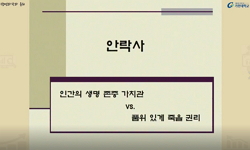The purpose of this study The purpose of this study is to discuss the existence of therapeutic means through genetic engineering, the right to bodily autonomy, bioethics, and the necessity of hospice care through My Sister’s Keeper, a movie directed...
http://chineseinput.net/에서 pinyin(병음)방식으로 중국어를 변환할 수 있습니다.
변환된 중국어를 복사하여 사용하시면 됩니다.
- 中文 을 입력하시려면 zhongwen을 입력하시고 space를누르시면됩니다.
- 北京 을 입력하시려면 beijing을 입력하시고 space를 누르시면 됩니다.

영화 <마이 시스터즈 키퍼>에 나타난 질병과 생명윤리 고찰 = A Study on the Disease and Bioethics in the Movie My Sister’s Keeper
한글로보기부가정보
다국어 초록 (Multilingual Abstract)
The purpose of this study The purpose of this study is to discuss the existence of therapeutic means through genetic engineering, the right to bodily autonomy, bioethics, and the necessity of hospice care through My Sister’s Keeper, a movie directed by Nick Cassavetes about the sacrifices a family must make for a terminally ill patient. In the movie, the life of the female protagonist has existential value as a means to a therapeutic end. The heroine raises the issue of bioethics by being born as a custom baby. The movie My Sister’s Keeper also borrows the subject matter of a lawsuit between family members. The movie closely presents the principles of autonomy based on bioethics and human dignity that can arise during the treatment process of a sick family member. Basically, the positive aspects of ‘custom-made babies’ can be found in the prevention and treatment of diseases with medical limitations. On the other hand, the negative aspects can be cited as problems in the level of bioethics and misuse of commercial use beyond the function of prevention and treatment. The commercial aspect of ‘custom-made babies’ is that it can expand into a business of investment and sales to secure superior genes by modifying genes or traits according to the preferences of parents, separate from medical prevention and treatment. This distortion of the essence of ‘custom-made babies’ has the potential to infringe upon the value of human life. In the movie, the factor that makes the patient suffer is not simply physical pain, but the awareness of the family’s miserable life caused by him. In the end, the patient is faced with a time of choice for the happiness of his family as he witnesses the dedicated sacrifice. It can be said that the one-sided effort to extend life is rather the decisive factor that makes the patient suffer. The sacrificial efforts of families for the patients within the family have limitations. This is because the patients can experience regret, guilt, and physical pain toward their families. In conclusion, life extension without the patient’s opinion forces suffering, and the need for hospice services for a dignified death is required.
동일학술지(권/호) 다른 논문
-
- 한국동서비교문학학회
- 정이화
- 2025
- KCI등재
-
- 한국동서비교문학학회
- 김한성
- 2025
- KCI등재
-
날로 홉킨슨의 『 미드나잇 러버』에 나타난 초월적 유토피아이상주의
- 한국동서비교문학학회
- 전소영
- 2025
- KCI등재
-
Beyond the Woman-Nature Dualism: Muriel Rukeyser’s Ecofeminist Poetics
- 한국동서비교문학학회
- HU XING
- 2025
- KCI등재




 DBpia
DBpia



